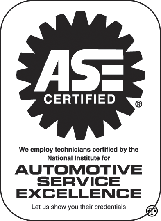• Monitor your tires. Under-inflated tires or poorly aligned wheels waste fuel by forcing the engine to work harder. Let the tires cool down before checking the air pressure. Out-of-line wheels, as evidenced by uneven tread wear, should be aligned by a professional.
• Consolidate your daily trips and errands. Also, try to travel when traffic is light so you can avoid stop-and-go conditions.
 |
| ASE Certified |
• Avoid excessive engine idling. Shut off your vehicle while waiting for friends and family.
• Observe speed limits. Speeding decreases your SUV's mileage.
• Drive gently. Sudden accelerations guzzle gas. Anticipate traffic patterns ahead and adjust your speed gradually. Use cruise control.
• Remove unnecessary items from the vehicle. Less weight can mean better mileage. Avoid carrying cargo on the roof, as this greatly increases drag.
• Use windows and air-conditioning wisely. Your car's mileage should improve if you keep the windows closed at highway speeds, since air drag is reduced.
• Keep your engine operating at its peak efficiency. A misfiring spark plug can greatly reduce gas mileage. Follow the service schedules listed in your owner's manual. Replace filters and fluids as recommended; have engine performance problems, such as rough idling and poor acceleration, corrected at a repair facility.
Given today's high-tech engines, it's wise to have this type of work done by auto technicians who are ASE certified in engine performance.
The National Institute for Automotive Service Excellence was founded in 1972 as an independent organization dedicated to improving the quality of automotive service and repair through the voluntary testing and certification of automotive technicians.
To learn more, visit the Web site at www.ase.com.
Don't Be Fuelish-Experts say with a little planning, it's possible to improve your SUV's gas mileage and performance.